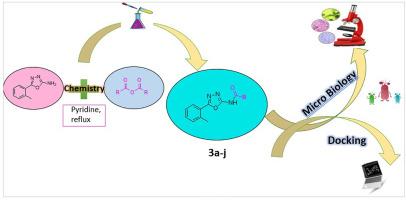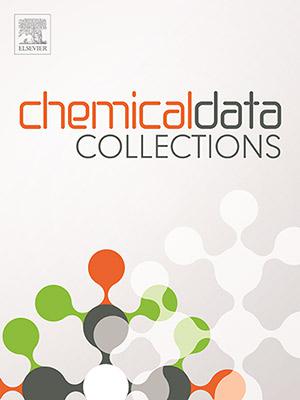Design, synthesis, characterization, invitro anticancer evaluation, computational studies, and in silico ADME assessment of New N-(5-o-tolyl-1,3,4-oxadiazol-2-yl) alkanamides
IF 2.218
Q2 Chemistry
引用次数: 0
Abstract
The present article focuses on the synthesis, docking, and anticancer efficacy of a new class of N-(5-o-tolyl-1,3,4-oxadiazol-2-yl) alkanamides (3a–j). 1HNMR, 13CNMR, Mass and Infrared spectral data established structures of all the analogues. We employed the MTT assay to estimate the potential anticancer efficacy of all the prepared analogues on MCF-7 cell lines. Among the derivatives tested, N-(5-o-tolyl-1,3,4-oxadiazol-2-yl)octanamide (3g) and N-(5-o-tolyl-1,3,4-oxadiazol-2-yl)dodecanamide (3j) exhibited remarkable anticancer activity; cisplatin is used as a standard reference. The active position of the EGFR protein complex with erlotinib (PDB ID: 1M17) was utilized for molecular docking analysis of the titled analogues. Among all the synthesized compounds 3j (-7.89 kcal/mol), 3g (-7.72 kcal/mol) and 3h (-7.34 kcal/mol) showed good binding affinity. An insilico ADME evaluation was conducted to estimate the drug likeness of synthesized compounds.

新型 N-(5-邻甲苯基-1,3,4-恶二唑-2-基)烷酰胺的设计、合成、表征、体外抗癌评价、计算研究和硅学 ADME 评估
本文主要研究了一类新的 N-(5-邻甲苯基-1,3,4-恶二唑-2-基)烷酰胺(3a-j)的合成、对接和抗癌功效。1HNMR、13CNMR、质谱和红外光谱数据确定了所有类似物的结构。我们采用 MTT 试验来评估所有制备的类似物对 MCF-7 细胞系的潜在抗癌功效。在所测试的衍生物中,N-(5-邻甲苯基-1,3,4-恶二唑-2-基)辛酰胺(3g)和 N-(5-邻甲苯基-1,3,4-恶二唑-2-基)十二酰胺(3j)表现出了显著的抗癌活性;顺铂被用作标准参照物。利用表皮生长因子受体蛋白与厄洛替尼复合物(PDB ID:1M17)的活性位置,对标题类似物进行了分子对接分析。在所有合成的化合物中,3j(-7.89 kcal/mol)、3g(-7.72 kcal/mol)和 3h(-7.34 kcal/mol)显示出良好的结合亲和力。为了估算合成化合物的药物相似性,对其进行了一项体内 ADME 评估。
本文章由计算机程序翻译,如有差异,请以英文原文为准。
求助全文
约1分钟内获得全文
求助全文
来源期刊

Chemical Data Collections
Chemistry-Chemistry (all)
CiteScore
6.10
自引率
0.00%
发文量
169
审稿时长
24 days
期刊介绍:
Chemical Data Collections (CDC) provides a publication outlet for the increasing need to make research material and data easy to share and re-use. Publication of research data with CDC will allow scientists to: -Make their data easy to find and access -Benefit from the fast publication process -Contribute to proper data citation and attribution -Publish their intermediate and null/negative results -Receive recognition for the work that does not fit traditional article format. The research data will be published as ''data articles'' that support fast and easy submission and quick peer-review processes. Data articles introduced by CDC are short self-contained publications about research materials and data. They must provide the scientific context of the described work and contain the following elements: a title, list of authors (plus affiliations), abstract, keywords, graphical abstract, metadata table, main text and at least three references. The journal welcomes submissions focusing on (but not limited to) the following categories of research output: spectral data, syntheses, crystallographic data, computational simulations, molecular dynamics and models, physicochemical data, etc.
 求助内容:
求助内容: 应助结果提醒方式:
应助结果提醒方式:


